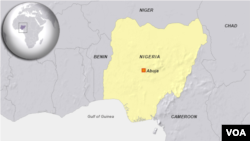ABUJA —
The Nigerian military has arrested more than 400 people traveling in southern Nigeria on suspicion they are members of the radical group Boko Haram.
The men, and reportedly a few women, were traveling in more than 30 buses when they were stopped by the army Sunday and detained at an army barracks in Abia state.
Local officials said they were suspected of being members of Boko Haram, an Islamist insurgent group that has killed thousands of people in the past five years, mostly in the far northeast of the country.
But on a scratchy phone line from the southern city of Port Harcourt, Balamato Danbam, a traditional leader from the north, says the travelers were traders, looking to do business in the south.
A church bomb in another southern city over the weekend again raised fears that Boko Haram is seeking to operate in the south.
Meanwhile, in the north, another attack was reported, with more than 20 people killed Sunday in the village of Daku.
More than 200 schoolgirls kidnapped in April remain missing, despite pledges from Nigerian authorities and governments around the world to free them.
The chairman of the U.S. House of Representatives Committee on Africa, Global Health, Global Human Rights and International Organizations, Chris Smith, spoke recently in Abuja.
“Boko Haram is a lethal force," Smith said. "They have grown in capability and weapons and the ability to evade detection. The effort will be protracted. No one is going to let up until the girls are released and until this violence is ended.”
Other visiting members of Congress said the United States is providing training and intelligence to help Nigeria combat Boko Haram and find the girls, but has not discussed placing “boots on the ground.”
Several countries have designated Boko Haram a terrorist organization, including the United States, Britain, and Nigeria. But analysts say mass arrests in the south, far from the insurgency, usually do not lead to convictions.
Hilary Uguru contributed to this report from the Niger Delta.
The men, and reportedly a few women, were traveling in more than 30 buses when they were stopped by the army Sunday and detained at an army barracks in Abia state.
Local officials said they were suspected of being members of Boko Haram, an Islamist insurgent group that has killed thousands of people in the past five years, mostly in the far northeast of the country.
But on a scratchy phone line from the southern city of Port Harcourt, Balamato Danbam, a traditional leader from the north, says the travelers were traders, looking to do business in the south.
A church bomb in another southern city over the weekend again raised fears that Boko Haram is seeking to operate in the south.
Meanwhile, in the north, another attack was reported, with more than 20 people killed Sunday in the village of Daku.
More than 200 schoolgirls kidnapped in April remain missing, despite pledges from Nigerian authorities and governments around the world to free them.
The chairman of the U.S. House of Representatives Committee on Africa, Global Health, Global Human Rights and International Organizations, Chris Smith, spoke recently in Abuja.
“Boko Haram is a lethal force," Smith said. "They have grown in capability and weapons and the ability to evade detection. The effort will be protracted. No one is going to let up until the girls are released and until this violence is ended.”
Other visiting members of Congress said the United States is providing training and intelligence to help Nigeria combat Boko Haram and find the girls, but has not discussed placing “boots on the ground.”
Several countries have designated Boko Haram a terrorist organization, including the United States, Britain, and Nigeria. But analysts say mass arrests in the south, far from the insurgency, usually do not lead to convictions.
Hilary Uguru contributed to this report from the Niger Delta.





